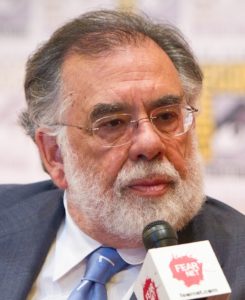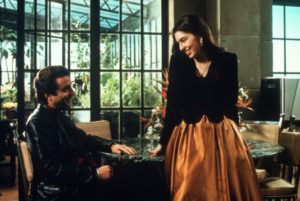
‘The Godfather: Part III’ is getting a makeover
Director Francis Ford Coppola re-edits the Mafia trilogy’s less-heralded third movie

With a thunderstorm raging outside the kitchen window, Michael Corleone in The Godfather: Part III expresses anger at the Mafia treachery keeping him connected to the underworld.
The thunderstorm outside can be said to reflect, at least symbolically, the inner turmoil that Corleone (Al Pacino) is going through.
“Just when I when I thought I was out, they pull me back in,” Michael says before collapsing in a diabetic stroke.
Now director Francis Ford Coppola is pulling movie fans back into The Godfather trilogy. The 81-year-old director has re-edited the third film for release in December.

Most movie fans won’t mind being pulled back in. While there are questions about any artist redoing an established work, Coppola’s new version is being met with curiosity and anticipation.
“Maybe we should be glad we’re getting to see another good Godfather,” film historian Jeanine Basinger told the Mob Museum in a telephone interview. She is the author of A Woman’s View: How Hollywood Spoke to Women, 1930-1960 and other books on film history.
The first two Godfather movies came out in 1972 and 1974, winning Oscars and widespread acclaim. Both are considered classics. The Godfather: Part III debuted in 1990. It is celebrating its 30th anniversary in December.
The third Godfather was released just months after Martin Scorsese’s now-classic Mob movie, Goodfellas. That film is centered on a real-life gangster, Henry Hill (Ray Liotta). Unlike the Godfather movies, it does not give much attention to those who rule Mafia empires. Any Mob movie coming out right after Goodfellas might have had trouble looking good in comparison.
The Godfather: Part III had a hard time being compared even to its own predecessors. Many critics viewed it as less successful than the first two. Some said the third movie’s convoluted subplots made the main story hard to follow.
The movie’s main focus is on the graying Michael Corleone’s effort to become a legitimate businessman and to make amends for the worst parts of his past, including responsibility for his brother’s murder.
But the third movie has a lot more going on than Michael’s late path in life and internal turmoil. There is a complicated Vatican banking scheme involving a shadowy, chain-smoking religious figure. Also, several characters are dispensed with in unusual ways. Among these are a helicopter assault on a meeting of Mafia leaders and, later, a lengthy death-by-cannoli sequence in an opera house. At the end, an elderly Michael, seated outside in a chair with no one around, slumps as if asleep and falls to the ground.
According to critics, The Godfather: Part III seems like a jigsaw puzzle without all the pieces — and with other pieces that don’t fit.
Coppola said the revised movie is closer to what he and author Mario Puzo had in mind. Puzo wrote the 1969 novel The Godfather and co-wrote the movie trilogy with Coppola. The third film’s new title is Mario Puzo’s The Godfather, Coda: The Death of Michael Corleone.
Puzo died in 1999 at age 78.
In a statement published in Vanity Fair magazine, Coppola said the new version “is an acknowledgment of Mario’s and my preferred title and our original intentions for what became The Godfather: Part III.”

“For this version of the finale, I created a new beginning and ending, and rearranged some scenes, shots, and music cues,” Coppola said. “With these changes and the restored footage and sound, to me, it is a more appropriate conclusion to The Godfather and The Godfather: Part II.”
Critics also took issue with Coppola’s then-18-year-old daughter, Sophia, in the third movie, saying her performance is unconvincing. Winona Ryder, originally selected for the role, stepped aside to star in Edward Scissorhands, according to The Ultimate Book of Gangster Movies. That movie, which stars Johnny Depp, came out the same month as The Godfather: Part III.
In the new version of the third Godfather movie, Coppola has recut some of his daughter’s scenes.
“I want to show Sofia a new version, because she is so beautiful in it and so touching,” Coppola told the Hollywood news website Deadline. “She wasn’t an actress. But she was the real thing, playing that 19-year-old Italian girl in love with her own cousin. Godfather III as The Death of Michael Corleone is doubly painful because at the end he doesn’t die, but he does worse than die. He loses everything he loves — and he lives. There are certain things in life that are worse than death.”
During a 2011 interview in the online interview magazine The Talks, Sophia Coppola, now a respected film director, said that at age 18, the last thing a person wants to do “is listen to what your parents say.”

“My dad was directing me, so it was awkward because I am not naturally an actress,” she said. “But I just wanted to try everything, and wasn’t expecting that so many people would look at it. I grew up with The Godfather as a familiar thing, but to me, it wasn’t this iconic masterpiece. It was a learning experience. But since I never wanted to be an actress it wasn’t devastating for me that people generally weren’t too fond of me being in it. After all, it was good because these kinds of experiences make you stronger.”
Coppola said his daughter’s portrayal was “one of the things that can be so improved” in a re-edited movie. “I believe that in a new version of The Death of Michael Corleone, Sofia’s performance will vindicate her,” he said.
Basinger said it is a “rare occurrence” for a movie to be redone like this. “There are very few films where we need filmmakers to go back and fix them,” Basinger said.
She said movies are a group effort, involving actors and many others, and become a part of film lore as presented when released. “They are made to go out to see if they stand the test of time,” she said.
Basinger said that while The Godfather: Part III has problems, she likes the movie, especially Pacino’s performance. As a viewer, she doesn’t need to see a new version. “I’m highly motivated to see films I love,” she said. “I’m not as motivated to see films changed.”
A complete redo raises the question about what becomes of the original. Movies have special meaning for audiences, she said. “We own them in our hearts and in our heads the way they are,” she said.
However, Basinger said she has enormous respect for Coppola and will watch the new version, happy to be pulled back in.
“Perhaps we need to allow him to show us what he really meant for it to be,” she said.
Larry Henry is a veteran print and broadcast journalist. He served as press secretary for Nevada Governor Bob Miller, and was political editor at the Las Vegas Sun and managing editor at KFSM-TV, the CBS affiliate in Northwest Arkansas.
Feedback or questions? Email blog@themobmuseum.org





